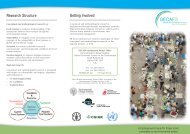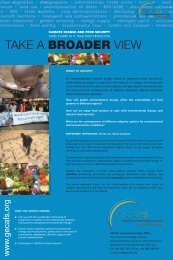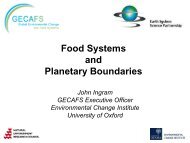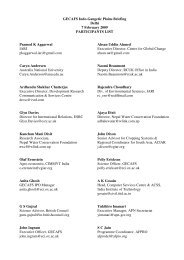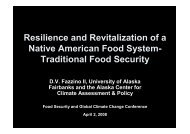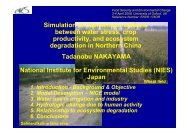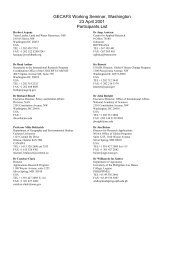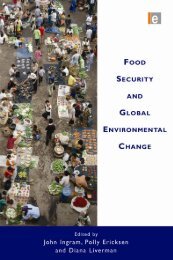From Food Production to Food Security - Global Environmental ...
From Food Production to Food Security - Global Environmental ...
From Food Production to Food Security - Global Environmental ...
- No tags were found...
Create successful ePaper yourself
Turn your PDF publications into a flip-book with our unique Google optimized e-Paper software.
Of the three types of questions, the subregional level and single cropping season is perhapsthe best researched <strong>to</strong> date, and especially the biophysical aspects of food production.However, in terms of food security, understanding and managing the dynamic cross-levelissues along all relevant scales are arguably more important. This certainly requires aninterdisciplinary approach, although research on cross-level interactions along jurisdictionaland institutional scales is perhaps of more interest <strong>to</strong> social scientists. This dicho<strong>to</strong>my isespecially so for regional/subregional cases where mismatch between regional and nationalpolicies can severely compromise the effectiveness of food production and other key fac<strong>to</strong>rsdetermining food security. Despite the multiscale, multilevel nature of food systems, differentscales are usually singled out as important at different levels, and which might act asbottlenecks <strong>to</strong> cross-level interactions.Matching research <strong>to</strong> regional information needs: Who is the ‘client’?Several arguments in support of undertaking GEC/food security research at regional levelhave been presented in Liverman and Ingram (2010: Paper 4). The notion of regionalresearch does however raise two important questions: ‘Who in particular wants <strong>to</strong> useresearch results at this spatial resolution?’; and ‘What do they want <strong>to</strong> know?’. While theremight well be academic interest in such studies, their utility in assisting in policy formulationat the regional level and their relevance <strong>to</strong> regional resource management would be slight ifthere is no obvious ‘client’. Further, even if identified, these clients need <strong>to</strong> be engaged inhelping <strong>to</strong> set the appropriate research agenda; it is important that research outputs match theinformation needs in relation <strong>to</strong> managing common agro-ecological zones, shared riverbasins, common problems, etc. Identifying groups and agencies that need information at thesespatial levels helps <strong>to</strong> determine the ‘client’.Identifying the ‘client’ at regional level can be relatively easy if, by chance, there is a formalentity whose geographical mandate approximately matches the geographical area of interestfrom a GEC viewpoint. Often such entities are economic and/or political groupings, such asthe Caribbean Community (CARICOM, which includes many of the Caribbean nations) andwhich nests well with regional studies of GEC-induced changes in hurricane track andintensity; or the South Asian Association for Regional Cooperation (SAARC) with reference<strong>to</strong> Asian ‘brown cloud’ studies. Another good example can be found in Southern Africa,where subcontinental studies on, for example, the regional transport of air, humanvulnerability and biodiversity loss, match much of the Southern Africa DevelopmentCommunity (SADC) region. While many such bodies have a clear food security mandate,and there may be a clearly expressed need for GEC/food security research for a given regionand/or by a given body, translating this in<strong>to</strong> a practical research package is daunting.One of the first challenges is <strong>to</strong> establish with which individual(s) in such organizations <strong>to</strong>engage. Often there is a unit related <strong>to</strong> food security (e.g. in SADC there is the Direc<strong>to</strong>rate for<strong>Food</strong>, Agriculture and Natural Resources, FANR). But given the major dependence on89



